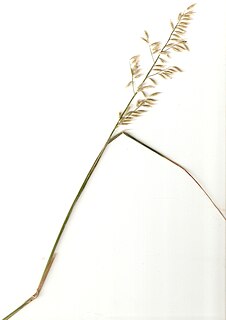
Melica picta is a species of grass in the family Poaceae that can be found in Europe, northwestern Africa and southwestern Asia.
Melica brasiliana, is a grass species in the family Poaceae that is endemic to Brazil and southern South America.
Melica turczaninowiana, is a species of grass found in Mongolia, North Korea, Russia (Siberia), and China.

Melica violacea, is a species of grass in the family Poaceae endemic to Chile.
Melica porteri, known as Porter's melicgrass, is a species of grass that grows in the United States and Mexico. In the US it is found in Arizona, Colorado, Kansas, New Mexico, Texas, Utah, and Iowa.
Melica serrana, is a species of grass endemic to Cerro de las Ánimas, Uruguay.
Melica scaberrima, is a species of grass that can be found in Yunnan, China, Nepal, Pakistan and northern part of India.
Melica onoei is a species of grass found in China, Japan, Korea, Pakistan and Taiwan.
Melica schafkatii, is a species of grass that can be found in Central Asia.
Melica hyalina is a species of grass found in Brazil and southern South America.
Melica lilloi is a species of grass found in Catamarca and Tucumán provinces of Argentina at 3,200–3,500 metres (10,500–11,500 ft) above sea level.
Melica minor is a species of grass in the family Poaceae. It is endemic to Caucasus.
Melica paulsenii is a species of grass endemic to Chile where it grows along the coastal cordillera at 50–700 metres (160–2,300 ft) above sea level.
Melica mollis is a species of grass endemic to Chile where it grows in rock crevices at 340 metres (1,120 ft) above sea level.
Melica minuta is a species of grass that can be found in North Africa, Western Asia, on Iberian Peninsula and in Southeast Europe.
Melica rigida is a species of grass found in Argentina, Brazil, and Uruguay.
Melica patagonica is a species of grass that is endemic to South America.
Melica parodiana is a species of grass found in Buenos Aires, Argentina and Uruguay.

Melica penicillaris is a species of grass in the Poaceae family. It is endemic to Inner Anatolia, Turkey, where it grows on bushy hills, rocky slopes, limestone surfaces, and in gullies at 1,000–1,800 metres (3,300–5,900 ft) above sea level.
Melica riograndensis is a species of grass in the family Poaceae that is endemic to Brazil.


